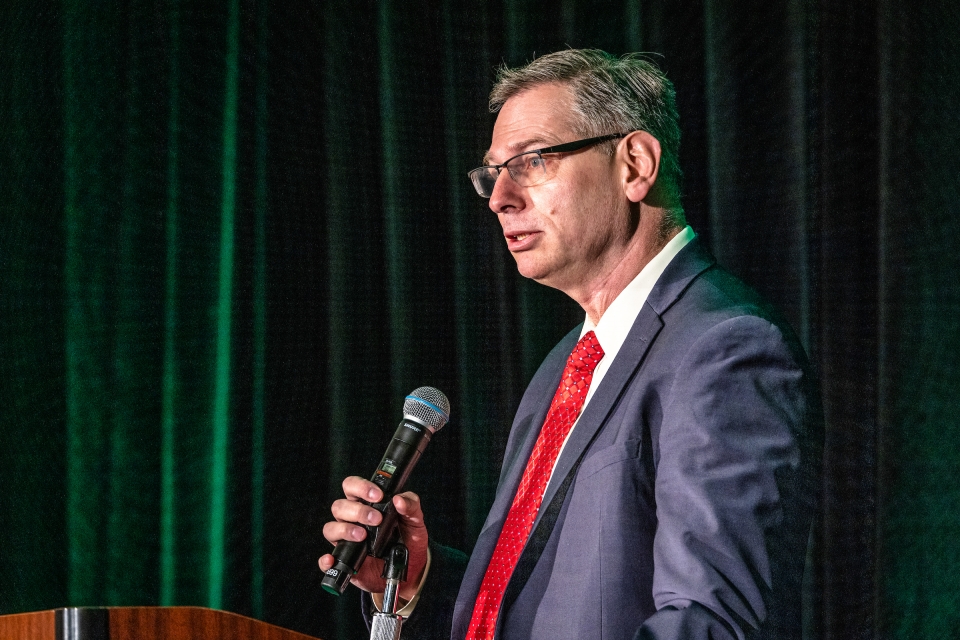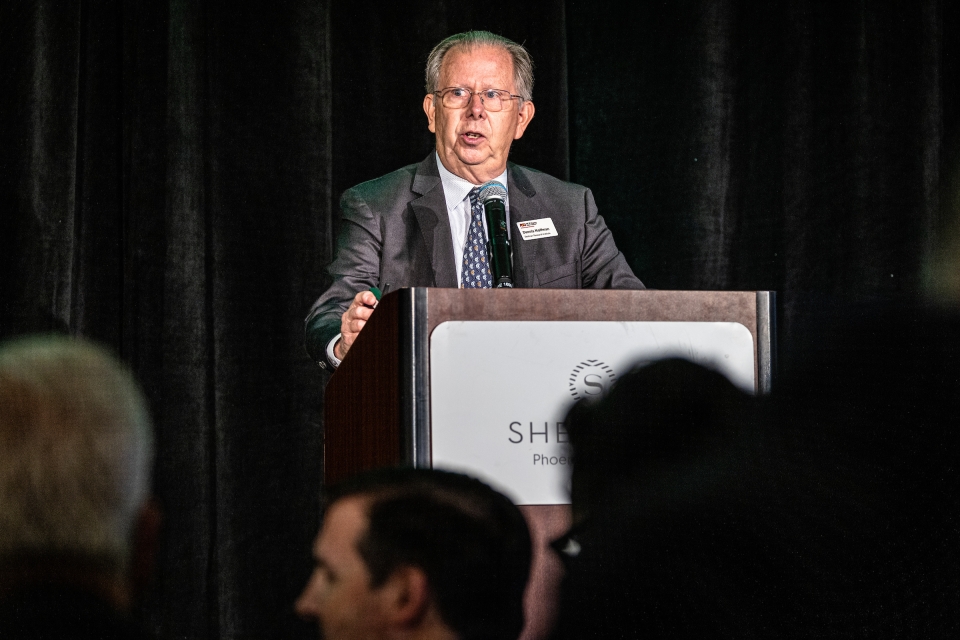An Arizona State University economist said the Grand Canyon State has managed to withstand the one-two punch of COVID-19 and record-breaking inflation, and a rebound in 2023 is possible. But the Arizona economy may have to gird itself for a recession in 2023 if the Federal Reserve System gets too aggressive with policy.
“What would that mean if somehow, someway, the Fed were too tight? It would mean tough sledding for Arizona, a hard fall for the economy,” said Dennis L. Hoffman, professor of economics and director of the L. William Seidman Research Institute at ASU’s W. P. Carey School of Business. “It will have harsh and laboring impacts.”
READ ALSO: Will Arizona see a recession? Here’s what experts say
READ ALSO: Metro Phoenix No. 1 in the nation for highest inflation
Hoffman presented his findings at the 59th annual Economic Forecast Luncheon on Wednesday in downtown Phoenix, sponsored by the W. P. Carey School of Business and PNC Bank.
“For almost six decades, this luncheon has attracted business and governmental leaders to hear a panel of distinguished speakers, economists, project business conditions for the coming year,” said W. P. Carey School Dean Ohad Kadan, who made his first appearance at the luncheon since joining the school in July.

In addition to Hoffman, speakers included Daniel J. Brady, senior vice president and chief investment strategist for PNC Asset Management Group, and Christopher Waller, a governor at the Federal Reserve System.
Hoffman said Arizona has recovered from the pandemic downturn before most states because its economy is strong and diverse. Health care, manufacturing, transportation/warehousing and scientific/technology industries are among the strongest in the nation, and unemployment is near a 40-year low.
Pre-COVID-19, Arizona outpaced all U.S. states in job creation and is gaining some ground in getting those jobs back, according to Hoffman. However, the state’s recent employment growth has been slower than the national average and will add over 100,000 jobs in 2022, with 86,000 in the metro Phoenix area.
Hoffman said Arizona sustained the pandemic and continuing inflation because of its business-friendly attitude and remaining as open as possible during the worst of COVID-19.
“We embraced business and recovered jobs faster than most of the nation did,” Hoffman said. “I would say we are still several hundred thousand jobs below trend. And it’s going to be a long time to make that up.”
The Arizona economy
But Hoffman said aggressive Fed policy might trigger a national recession, bringing higher unemployment rates, reduced job growth and a slowdown in residential building. However, Hoffman believes in the current strength of the Arizona and Phoenix economies; the effect should be milder compared with other states.
He attributes this to the five Arizona industries that ranked among the fastest-growing in the nation:
• Health care, which added more than 15,000 jobs in the past year, is up 3.9% and is ranked second in the nation.
• Manufacturing added more than 10,000 positions in the state, has grown by 5.7% and is ranked fifth in the country.
• Transportation/warehousing added more than 12,000 jobs and has shot up 9.4%. It is ranked fifth in the nation.
• Science/technology has become a hub, adding approximately 13,000 positions and is up by 7.6%, ranking eighth in the country.
• Retail trade added 12,100 jobs for Arizonans, ranking 10th in the U.S.
Hoffman gave special kudos to the manufacturing industry, which was a welcome surprise in the wake of the pandemic.
“Manufacturing is a fantastic story,” Hoffman said, predicting the number of jobs will quickly climb to 15,000. “Many of us thought manufacturing would be tough to bring back to Arizona. And I think that’s a testament to creating a welcoming business climate.”

The Phoenix metro area was responsible for approximately 112,000 new jobs in 2022, or 3.8 % growth. These cities followed: Flagstaff (4,770, or 7.6%), Prescott (2,890, or 4.4%), Yuma (2,400, or 4.2%), Lake Havasu (2,070, or 3.9%), Tucson (12,500, or 3.3%) and Sierra Vista (450, or 1.3%).
While job growth will take a sharp dip in 2023, the state’s population will also slow down, but not by much, according to Hoffman. He said Arizona ranks as the fourth fastest-growing state and the top three location for domestic movers, behind Florida and Texas.
Income levels, affordable housing, inflation and Fed rate hikes will affect exactly how many people will come to Arizona in 2023 because the state is 50% less affordable than five years ago.
“It’s simple. When you double the mortgage rate, the cost to finance a home dramatically goes up,” Hoffman said. “Millennials are reaching the age where they want to consume housing and it’s increasingly out of reach for them, so this is a concern.”
Home sales have “fallen dramatically” according to Hoffman, costing the state about a billion dollars a month in income.
“That represents a lot of income for people in the real estate community,” Hoffman said.
Hoffman said concerns over climate change, lack of water, women’s rights, education issues and border crisis concerns could play a part in attracting innovative workers, especially those in the tech industry, who can live and work anywhere. His biggest concern is the Fed, whose policies could slow down many markets and could stagnate Arizona into 2024 or 2025, Hoffman said.
Some of those concerns were allayed by Waller, who said the Fed’s main goal was to fight inflation, not create economic problems for the states.
“Slowing down economic growth is necessary to bring inflation back down to our 2% target,” Waller said. “This slowing in activity is a sign that actions taken by the Federal Reserve this year to reduce inflation are working.”
Waller said by boosting interest rates, the Fed can curtail spending and investments by households and investments, which has created a bottleneck for supply.
“Slowing home sales will decrease demand for goods that complement the purchase of a new home and demands for goods, such as new carpet, new furniture, new lawn mowers and so on,” Waller said. “This will put some downward pressure on those prices. Our goal is to rein in demand and supply into better balance.”
Hoffman said the Arizona economy will prevail through the tough times because of its attitude toward business and commerce.
“Frankly, we have long-term economic advantages in this state. This is a very pro-growth economic setting,” Hoffman said. “This is a state where we’ve traditionally embraced business. We understand that business brings prosperity to the vast majority of people.”




